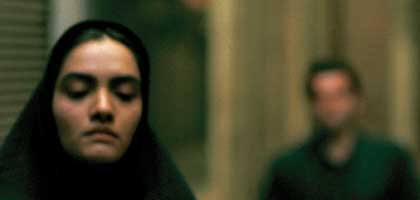Primary navigation


Jonathan Romney welcomes a film that illuminates new aspects of Iranian society for western eyes, with a wintry backdrop that reflects its male characters' emotional isolation and petrifaction
It is perhaps a professional deformation among western critics that we find ourselves consistently on the lookout for novelty and revelation in Iranian cinema. It may be that the shock of the new - so keenly felt with the early 1990s wave of releases from Kiarostami, Makhmalbaf and Panahi - has passed, and that we now feel so familiar with certain Iranian styles that we have simply become jaded.
But we also seem to hope that every new Iranian film will reveal something different about a society the west doesn't know terribly well; that each one will test the limits of representation in a country where cinema operates under strict rules concerning what can and cannot be said about social and sexual behaviour. We are eager, too, for anything that offsets the conventional western preconceptions of Iran - the CNN view, as it were. That is no doubt one reason why we seized so excitedly on, for example, Jafar Panahi's extraordinary Crimson Gold, both because it presents a more cosmopolitan image of Tehran than we are used to, and because of its strikingly anomalous protagonist, a schizophrenic pizza-delivery man.
Whether or not we are simply lumbering Iranian cinema with western expectations, 2006 has been a good year for such pushing of boundaries, with two key films presented in Berlin. One was Panahi's boisterous feminist comedy Offside. The other, less obviously provocative, but remarkable nonetheless, is It's Winter (Zemestan). In its melancholy tone and composed formal qualities, Rafi Pitts' film might not immediately strike one as radically new. But It's Winter is nevertheless a striking departure from the expected that widens our picture of Iranian life and film.
This extremely spare drama, shot in an industrial suburb south of Tehran, begins with Mokhtar, a weary husband and father, losing his job and going abroad in search of work - a futile quest, as it happens. He returns towards the end of the film, penniless, estranged from his family, missing one leg and apparently suicidal: we are led to assume that he throws himself under the train that Marhab, his younger replacement in his home, is himself about to board.
Mokhtar and Marhab - who never meet, although they briefly sit in the same bar - might be seen as two stages of the same man. At least, Mokhtar represents something that Marhab, if he doesn't mend his ways, seems fated to become. At the end, it's implied, Marhab has a chance to learn from Mokhtar's errors and his own, and to integrate himself into society as a properly adult man. In this sense, It's Winter is a moral tale, though the possibility of redemption is only hinted at in the wordless shots that round the film off as it started, in thick winter whiteness - the snow now reading as a blank slate for Marhab's future.
Overall, the film presents a fairly scathing picture of Iranian men. Mokhtar is a sorry sort of paterfamilias, blaming his wife, Khatoun, for the decision to build a house instead of leaving investable money that might provide an income (presumably without his having to work). In the final shot, however, it is the house that is shown withstanding the assault of the elements and passing time.
Marhab is arrogant, boasting of his expertise but showing every sign of being a ham-fisted mechanic. He believes the world owes him a living (though it should be said in his defence that his boss actually does - two months' back wages, to be exact). He's pessimistic and self-pitying, blaming everything on the "bastards" who won't let him settle down; he's petulant, vindictive, an idler and apparently quite cynical. In the film's most shocking moment, he tells his workmate Ali Reza (whose friendship Marhab later throws in his face), "Parents, once they're old, you should forget about them." Marhab says he left his home not because he had no work, but because the climate didn't agree with him; the film's ending bitterly proves that you can't escape bad weather.
As for Marhab's feelings about Khatoun, the film is ambivalent. His pursuit of her verges on stalking as he trails her through shuttered, arcade-like streets; his first move to attract her attention is through the devious strategy of offering her young daughter a jumper. This approach may be dictated, of course, by conventions governing the 'appropriate' courtship of a married woman by a young single man, but this theme contributes to the film's subtly shocking quality.
Whether Marhab is just predatory or genuinely lovestruck remains unclear. He marries Khatoun (vulnerable, or herself opportunistic?) with what seems indecent haste, though it's actually Ali Reza who prompts him to act as soon as word arrives of her husband's presumed death: "She's available." The wedding ominously takes place in a drab office, after which we see barely anything of the couple's married life, right up to Marhab's departure.
And yet the film lets us see why Khatoun might find Marhab an appealing prospect. Compared to the sullen Mokhtar, he's a breath of fresh air, especially as played by Ali Nicksolat, a non-professional like the rest of the cast. Marhab is energetic, shyly charming, handsome in a proletarian matinée-idol way. His black jacket and jeans, pompadour and sideburns make him a bad-boy anti-hero of a sort western audiences will recognise: there's a touch of Brando, especially in Nicksolat's slightly high-pitched voice, plus echoes of every American drifter-in-town from the cowboy tradition to Jim Thompson and beyond (the subtitle "I'm not exactly local" could just as well be translated, after Johnny Guitar, as "I'm a stranger here myself").
At the end, we certainly want Marhab to get another chance; but Khatoun deserves a shot at happiness even more. She calmly endures her feckless men's whinging, gets on with building a stable world for herself and her daughter, and is a resilient, competent worker: repeated shots of her at work in a clothing factory establish her as an everyday shopfloor heroine.
The sense of a subtly new perspective brought to Iranian cinema may stem partly from Pitts' cosmopolitan background. Half-British, he studied film in London and worked in France as assistant director to Jacques Doillon. As well as two previous well-received fictions, Sanam (2001) and Season Five (1997), he has made a French television documentary, Abel Ferrara: Not Guilty, that by all accounts captures the wild man of Manhattan at very close quarters. It's tempting to see Marhab as the nearest Iranian cinema has come to a Ferrara anti-hero, and though he's hardly as dissolute as the Bad Lieutenant, Marhab is certainly the most complex and abrasive male in recent Iranian film outside Crimson Gold.
Stylistically, It's Winter combines quasi-documentary working-life realism with an elliptical, parable-like approach. The setting is a very concrete world of hard toil. We hear variously that there's no work to be found, and that there is; but either way, Pitts shows an economically challenged nation, complete with images of homeless men camped under a flyover.
The film's measured formal qualities emerge in its ellipsis and discontinuity. When Mokhtar suddenly returns, Pitts simply presents him in close-up, with no rhetoric to make his reappearance more dramatic. Marhab's ejection from the car plant and his angry retaliation are treated with whirlwind concision. Long shots often obscure what's happening: we never hear what's said during a police car's several visits to Khatoun's house. The closing sequence, again teasingly using long shots, is particularly economical, its full meaning only emerging when Marhab calmly picks up Mokhtar's crutch from the snow-covered ground - but it's left to us to decide exactly why Marhab declines to board the train.
Pitts' sombre, enigmatic picture of contemporary Iran is strikingly unfamiliar, but beyond that It's Winter represents a trenchant take on the universal theme of male solipsism and emotional isolation. When we first hear the bleakly haunting lament from a poem by Mehdi Akhavan Saless - "They won't answer your greeting/For their heads are lowered into their collars" - we might read it as the film's own comment on the harshness of life. But by the end, when the same song accompanies Marhab, we understand it as one that he and Mokhtar sing internally, as they muse self-pityingly on the world's injustice. Men, the film suggests, carry their own winter with them.